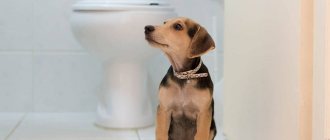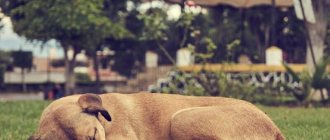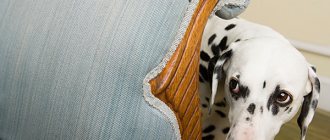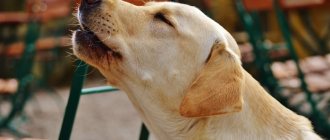Owners of Yorkshire terriers, like no one else, know what a playful and perky character their pet has. Fidgety Yorkies are sociable and friendly animals that will happily play with you and your children or pose for the camera. They love their owner and follow him everywhere like a tail, trying not to lag behind even a step.
Despite the fact that these are not guard dogs, they are highly trainable and will happily follow any commands as long as they please their owner and earn his attention.
Advertising:
Although the Yorkie puppy has a wonderful appearance, for which he is often called a “plush” or “doll” dog, he is relatively easy to care for. Its long fur, which falls in even strands on the sides and is more like human hair, is a special asset, and since it has no undercoat, it does not smell at all and practically does not cause allergies.
Pets have bangs that need to be kept out of the eyes so that the baby can see. There are many variations of hairstyles and different ways to style this “mane”, so you can show your imagination and creativity. While caring for and raising your four-legged household member, you may encounter such troubles as problems with bowel movements.
The first and most important advice is - if you don’t know what to do, don’t experiment on an animal. Such an important and delicate issue should not be postponed or neglected under any circumstances.
The baby, since he has a fast and good metabolism, should poop 3-5 times a day, older individuals up to 2 times. The feces should come out in a so-called “sausage”, the same color and smooth, without jagged edges or other foreign bodies.
If the stool becomes loose and bowel movements become more frequent, then it is quite possible that you are faced with a problem such as diarrhea in your Yorkie. Or, on the contrary, if you notice that your puppy cannot go to the toilet normally during the day, then you should pay attention to this. Without treatment and without taking any action to eliminate constipation, you risk facing unpleasant consequences, such as:
- rupture of the walls of the colon;
- damage to nearby organs;
- general poisoning of the body with stagnant feces;
- Possible death.
What to do when your dog doesn't poop regularly
If your puppy or adult dog is experiencing irregular bowel movements, whether constipation or diarrhea, there are a few things you can do to help.
The first thing you should do is go to the vet. It is absolutely important that you do this before a small problem turns into a devastating disaster. When you go to the clinic, they will be able to perform all the necessary tests to get to the root of the problem. Be prepared—this visit can be expensive, and it can turn into a multi-task affair. All this, however, is worth it to ensure your pet recovers faster.
Now that you know what to do first, here are some other suggestions on what you can do to help your bowel movements become regular again.
Diarrhea
- To solve the problem, you must be careful with the food you give to your dog. Provide her with water and do not give her food for about 12 hours to allow the gastrointestinal tract to settle.
- Give her some of these foods to see if they help: canned pumpkin, yogurt, cheese, skinless chicken, and a specially formulated dog food that your veterinarian may recommend.
Constipation
- Give her the following foods: pumpkin, canned dog food, fiber supplements, and olive oil. They all contain a lot of fiber or lubricant because they have tons of water.
- Make sure your dog gets plenty of exercise. Remember, a sedentary lifestyle leads to a sedentary digestive tract! Walk, run, play and practice doing tricks if you feel like it. This will get the blood flowing and the entire system will move like new again.
- Have her drink plenty of water and the electrolyte supplements your veterinarian recommends, if needed. Hydration is the key to a healthy body.
Now go help your dog get back to his best self as quickly as possible! Time is the essence. Good luck and give your dog lots of love.
Source
When there is too little stool
It may be that your dog is actually constipated, which is normal from time to time, but can become dangerous with prolonged exposure. If your dog doesn't poop for a few days, you should start paying closer attention and worrying. Here's why your dog may become constipated :
- Lack of exercise . Without exercise and play, your dog may not poop as often as an active dog.
- If your dog doesn't get enough of a fiber-rich diet, he may become constipated . Fiber is essential to keep living things “regular.” This can also happen in people with constipation.
- For some reason, summer dogs naturally poop less frequently .
- Tumors of the digestive tract . This is one of the most serious problems that will probably require surgery to fix, and guess what? Surgery can cause constipation in dogs too!
Solution
You can help your pet at home. One of the best options when you do no harm and can alleviate the situation is to give Vaseline oil with a syringe without a tip. Since this oil is not edible, unlike sunflower oil, it is not absorbed into the intestinal walls, but it lubricates them well and promotes the passage of feces.
An enema is also a good remedy for constipation, but you should be careful not to overdo it. It is recommended to make an infusion solution from a warm chamomile decoction, but if the liquid does not pass, there is no need to apply it, perhaps the reason why the dog does not defecate is intestinal obstruction.
In this case, you need to contact a specialist for help. It is temporarily worth excluding small bones and cartilage from the puppy’s diet, as well as rice, corn, eggs, and cheese. Instead, it is recommended to add light broths, vegetable juices and other liquids. Well, as previously mentioned, do not forget about the benefits of fresh air and walks with your pet.
You can also give the animal a laxative, Duphalac will do, but this issue should be approached wisely, and it is better to preempt the situation and get approval from a doctor. Of course, if the root of the disease is parasites in the intestines, then without unnecessary delay you need to contact a veterinarian so that he can provide qualified medical care.
Pay attention to your four-legged friend, spend time with him and take care of his health and development. A puppy is the same child who becomes attached to you and completely trusts himself and his life. Love and appreciate your little furry friend. By showing attention and care, you will prevent many diseases and problems, maintaining the health and good spirit of your pet. And he will repay you with loyalty, affection and love.
You need to prepare in advance:
- 2 bowls (for food and water). Preferably on a stand so that the puppy does not turn them over.
- Food, for example, “Grandorf. Lamb with puppy rice,” or any other.
- Place for the toilet - tray (optional), diaper (disposable or reusable).
- Toys. Rubber, fabric - not fragile, without small parts and pungent odor.
Care and hygiene products:
- Shampoo “Iv San Bernard” (bathing once a month).
- Conditioner “Iv San Bernard” (swimming once a month).
- Metal comb with wide teeth (comb at least once a week).
- Powder brush without drips at the ends (comb at least once a week).
- The nail clipper is not large (trim your nails every week).
- Tooth gel “Cliny” with silver ions (clean every three days).
- Toothbrush for dogs, sponge (at your discretion).
- Pedigree sticks. Dentastix. Mini" (instead of toothpaste, you can do it daily).
- Cliny oral spray (optional).
- First aid kit
Conditions for keeping a puppy
Walks
Spitz needs daily, long walks. We recommend walking your puppy on a leash. In warm weather, take water with you. Spitzes freeze in winter despite their rich coat. Therefore, take care of warm clothes and shoes in advance. Walking in winter is good for the coat. In rainy weather, a “raincoat” will protect the dog from dirt.
Diaper training
We advise you to walk the puppy after going to the toilet for a diaper. Otherwise, the puppy will get used to relieving itself on the street. We recommend watching this video.
If the puppy doesn't stay at home
Feed by the hour and remove food after feeding. The dog should look forward to the food. Leave a bowl of food when you leave home. The puppy's attention will be focused only on the food. He will eat and fall asleep.
Note:
- Do not let the puppy on the bed or sofa. He may fall and get injured.
- Don't let them bite your hands. This habit is very difficult to break. Distract the puppy with toys, do not expose your hands.
- Do not feed your dog from the table, do not overfeed or spoil him with treats.
- Keep your distance, let's understand that you are the leader.
- If he gnaws on something, rub the area with garlic or onion. The smell will scare away the “rodent”. Scold, then distract the puppy with a hard treat or toy.
- Don't hit the puppy. Punish with words, intonation, or wag your finger.










